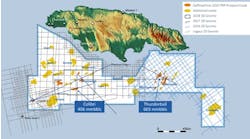Robin Dupre * Houston
TheUnited States is in the midst of an historic energy boom, producing 8.5 MMb/d of hydrocarbons, a 50% increase – or roughly 3 MMb/d – compared to 2011, Exxon Mobil Corp.’s CEO, Rex Tillerson told the Greater Houston Partnership (GHP) at its recent State of Energy event.
“The US is in the midst of what can only be called a transformative moment in the history of energy,” he stated.
Exxon’s CEO gave his perspective on the current energy industry in Houston, the state of Texas, and North America, noting that the continent is the current energy powerhouse in the world, “and Houston is at the center of this revolution.”
Houston’s metro area created 112,200 jobs in the past 12 months, a 4% annual growth rate, according to the Greater Houston Partnership. This 4% represents acceleration in job growth – once again making Houston a leader among the nation’s major metros. Overall, Houston has enjoyed month-to-month job growth in 50 of the past 60 months.
High oil prices are supporting employment growth in exploration, oilfield services, and oilfield equipment manufacturing, reported GHP. With the expansion of chemical plants along the Texas Gulf Coast now driving growth in construction, metal fabrication and energy services, the state will continue to be a leader in the North American energy renaissance, Tillerson said.
“In less than a generation, we progressed from engineering concepts hand-drawn on drafting tables – that’s how I had to do them – to sophisticated computer-designed rigs,” he said, noting that some facilities now sit in 10,000 ft (3,048 m) of water. “We project that from 2010 to 2040, deepwater production worldwide will grow 150%,” Tillerson said. “The people and companies of Houston will be critical to this effort.”
Texas ranks eighth in worldwide production and is the leading crude oil-producing state in the nation. In 2013, the state exceeded production levels even from the federal offshore areas. The technology advances in hydraulic fracturing and horizontal drilling that are unlocking vast resources onshore, Tillerson noted, can be applied offshore, making the opportunity fordeepwater play unprecedented.
The US Energy Information Administration predicted thatUS production will continue to expand to about 9.5 MMboe/d by the end of next year. This abundant supply of natural gas place the US in a position to become an energy exporter, reversing four decades of fear and anxiety about energy scarcity, he added.
“We face an urgent need to learn the appropriate policy lessons to fully leverage this historic moment. We need new policies designed for this new era of abundance,” he commented, “not policies based on the fear of scarcity.”
ExxonMobil expects global energy demand to increase 30% by 2040, creating a need for sound policy, Tillerson explained. The US needs far-sighted, not short-sighted policies to achieve energy independence, he noted, using the Keystone XL pipeline project as an example of what happens when policies and the government veer off track.
By reducing global price volatility, moderating international tensions, and providing energy flexibility, “we could see the same economic and environmental benefits that have taken place in the United States repeated around the globe,” Tillerson concluded.



